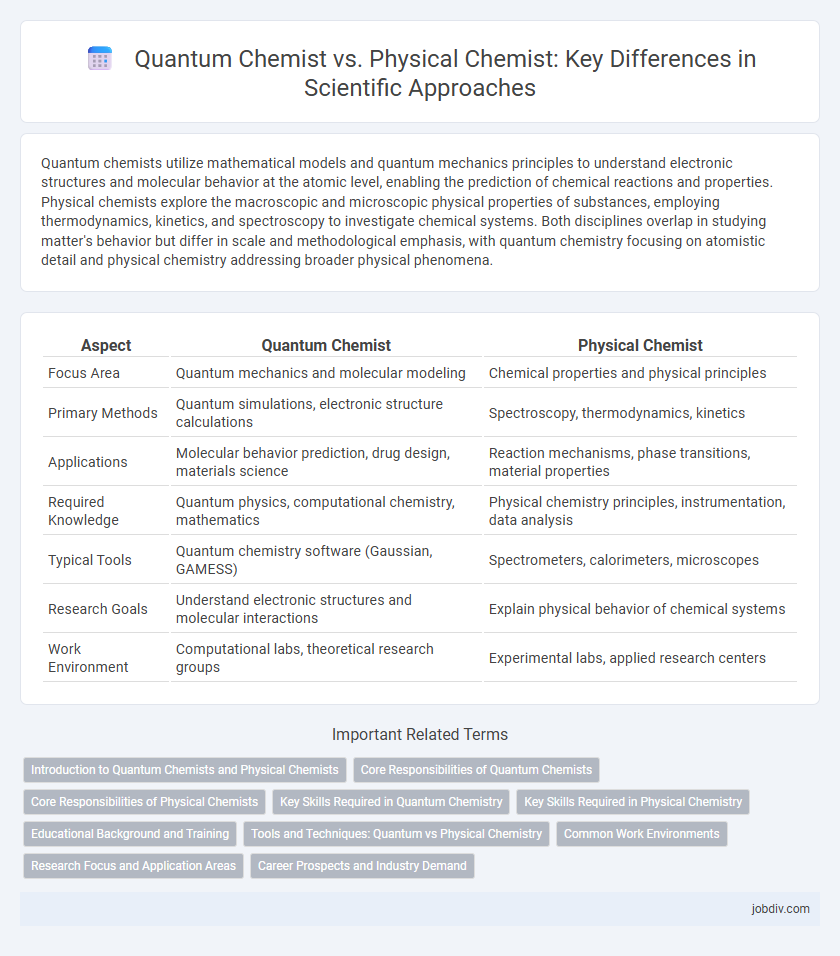Quantum chemists utilize mathematical models and quantum mechanics principles to understand electronic structures and molecular behavior at the atomic level, enabling the prediction of chemical reactions and properties. Physical chemists explore the macroscopic and microscopic physical properties of substances, employing thermodynamics, kinetics, and spectroscopy to investigate chemical systems. Both disciplines overlap in studying matter's behavior but differ in scale and methodological emphasis, with quantum chemistry focusing on atomistic detail and physical chemistry addressing broader physical phenomena.
Table of Comparison
| Aspect | Quantum Chemist | Physical Chemist |
|---|---|---|
| Focus Area | Quantum mechanics and molecular modeling | Chemical properties and physical principles |
| Primary Methods | Quantum simulations, electronic structure calculations | Spectroscopy, thermodynamics, kinetics |
| Applications | Molecular behavior prediction, drug design, materials science | Reaction mechanisms, phase transitions, material properties |
| Required Knowledge | Quantum physics, computational chemistry, mathematics | Physical chemistry principles, instrumentation, data analysis |
| Typical Tools | Quantum chemistry software (Gaussian, GAMESS) | Spectrometers, calorimeters, microscopes |
| Research Goals | Understand electronic structures and molecular interactions | Explain physical behavior of chemical systems |
| Work Environment | Computational labs, theoretical research groups | Experimental labs, applied research centers |
Introduction to Quantum Chemists and Physical Chemists
Quantum chemists apply quantum mechanics to model molecular interactions and electronic structures, using computational methods like density functional theory and wavefunction analysis. Physical chemists study macroscopic and microscopic physical properties of chemical systems, employing thermodynamics, kinetics, and spectroscopy to understand reaction mechanisms. Both disciplines integrate theoretical principles and experimental techniques to explore molecular behavior and chemical transformations.
Core Responsibilities of Quantum Chemists
Quantum chemists utilize principles of quantum mechanics to model molecular systems, predict electronic structures, and analyze reaction mechanisms at the atomic level. Their core responsibilities include developing computational methods, running simulations to solve Schrodinger equations, and interpreting spectroscopic data to understand chemical properties. These tasks contrast with physical chemists who often focus on experimental techniques and macroscopic chemical phenomena.
Core Responsibilities of Physical Chemists
Physical chemists specialize in studying the physical properties and behaviors of molecules using techniques such as spectroscopy, thermodynamics, and quantum mechanics. They analyze reaction rates, energy transfer, and molecular structures to understand chemical processes at the atomic and molecular levels. Their work often involves experimental design and data interpretation to develop models explaining material properties and chemical dynamics.
Key Skills Required in Quantum Chemistry
Quantum chemists require strong expertise in advanced mathematics, particularly linear algebra and differential equations, to model molecular behavior accurately at the quantum level. Proficiency in computational techniques and programming languages like Python or Fortran is essential for developing and using quantum mechanical simulations. In contrast, physical chemists prioritize experimental techniques and a broader understanding of thermodynamics, kinetics, and spectroscopy, though some overlap in quantum mechanics knowledge exists.
Key Skills Required in Physical Chemistry
Physical chemists require strong analytical skills, proficiency in spectroscopy, thermodynamics, and kinetics to investigate molecular behavior and reaction mechanisms. Expertise in advanced mathematical modeling and computational techniques enables the interpretation of experimental data and simulation of chemical processes. Mastery of laboratory instrumentation and experimental design is essential for conducting precise measurements and validating theoretical predictions.
Educational Background and Training
Quantum chemists typically possess advanced degrees in chemistry or physics, emphasizing strong mathematical skills and specialized training in quantum mechanics, computational methods, and electronic structure theory. Physical chemists often hold degrees in chemistry with a focus on thermodynamics, kinetics, spectroscopy, and experimental techniques, supported by laboratory experience in molecular behavior and chemical processes. Both disciplines require rigorous coursework and research, but quantum chemists concentrate more on theoretical models and simulations, while physical chemists balance theoretical understanding with empirical experimentation.
Tools and Techniques: Quantum vs Physical Chemistry
Quantum chemists primarily utilize computational methods and quantum mechanical models such as Schrodinger's equation, density functional theory (DFT), and ab initio calculations to predict molecular behavior and electronic structure at the atomic level. Physical chemists rely on experimental techniques like spectroscopy, calorimetry, and chromatography to analyze thermodynamic properties, reaction kinetics, and molecular interactions in macroscopic systems. While quantum chemistry emphasizes theoretical simulations and mathematical formulations, physical chemistry integrates laboratory-based empirical approaches to understand chemical phenomena.
Common Work Environments
Quantum chemists and physical chemists commonly work in research laboratories within academic institutions, government agencies, and private industry. Both professionals often utilize advanced computational facilities and spectroscopy labs to analyze molecular structures and chemical reactions. Collaboration with interdisciplinary teams is frequent, especially in environments focused on materials science, pharmaceuticals, and energy research.
Research Focus and Application Areas
Quantum chemists study the behavior of molecules at the atomic and subatomic levels using quantum mechanics, with research applications in molecular modeling, spectroscopy, and reaction dynamics. Physical chemists investigate macroscopic chemical systems by analyzing thermodynamics, kinetics, and material properties, contributing to fields like materials science, catalysis, and surface chemistry. Both disciplines overlap in areas such as computational chemistry but differ primarily in their emphasis on theoretical versus experimental approaches.
Career Prospects and Industry Demand
Quantum chemists possess expertise in applying quantum mechanics to chemical systems, making them highly sought after in advanced research sectors such as pharmaceuticals, materials science, and nanotechnology, where molecular-level simulations drive innovation. Physical chemists, with a strong foundation in thermodynamics, kinetics, and spectroscopy, find diverse opportunities in industries like chemical manufacturing, environmental analysis, and energy development, benefiting from their broad practical skill set. The rising demand for quantum computing and precision modeling accelerates growth prospects for quantum chemists, while physical chemists remain essential in applied industrial research and process optimization.
Quantum Chemist vs Physical Chemist Infographic

 jobdiv.com
jobdiv.com